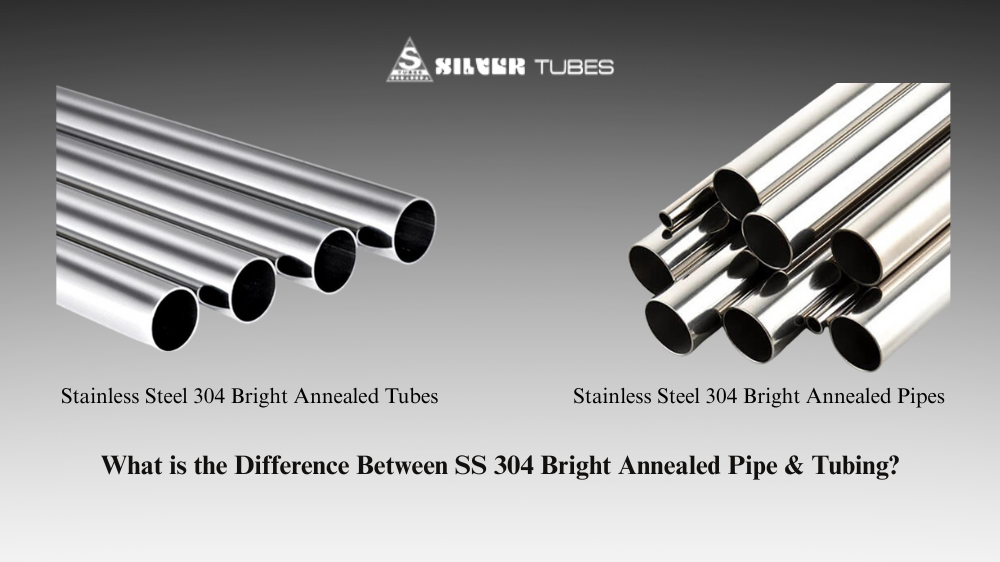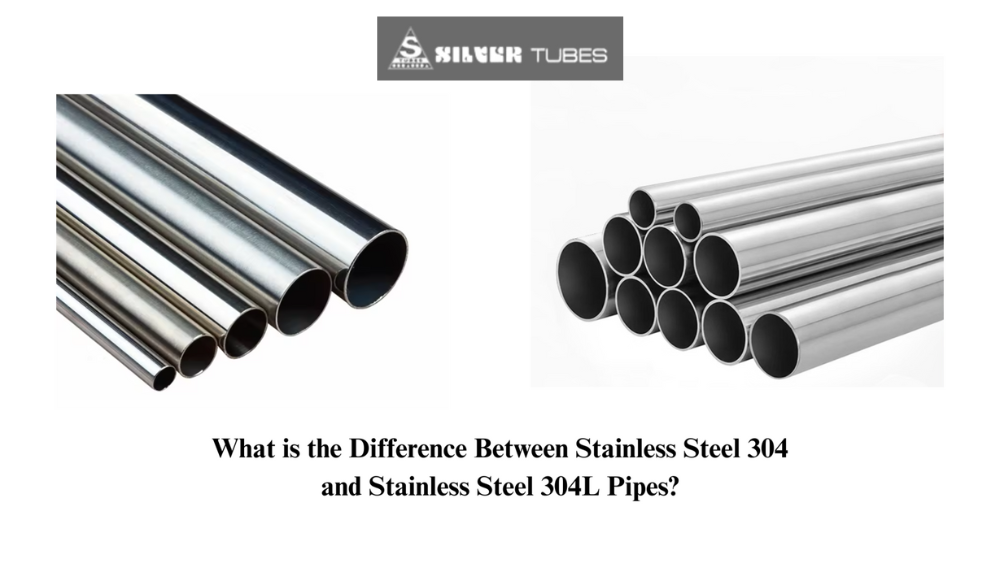The nickel-chromium-based superalloys Inconel 600 and Inconel 625 are known for their exceptional resistance to corrosion, oxidation, and heat. Despite having comparable basic elements, their composition, mechanical characteristics, and performance in harsh environments vary. Each alloy is appropriate for particular industrial applications due to these variations.
What is Inconel Steel
Inconel is a part of a nickel-chromium alloy that is known for its toughness and ability to withstand heat and corrosion. The alloys are stable even at high temperatures. Inconel pipes and tubes find application in processes where materials have to endure both pressure and heat. The material does not oxidize readily or become weak when hot. This makes them applicable in power generation, chemical plants, marine systems, and aeronautical structures. Two most common grades are Inconel 600 and Inconel 625. Although both are high-performance alloys, they are different in their composition and characteristics and are used for particular applications.
Overview of Inconel 600 Pipes &Tubes
Inconel 600 (UNS N06600) is a nickel-chromium alloy that is resistant to oxidation and corrosion. It is suitable for high-temperature applications.
Important Features of Inconel 600 Pipes
-
- High Temperature Strength: At elevated temperatures, Inconel 600 pipes do not lose their structure. It makes them trustworthy for high heat applications as they don’t deform.
-
- Good Resistance to Corrosion: In various circumstances, these pipes withstand chemical assaults, oxidation and scale. They can therefore be used in both alkaline, and acidic environments.
-
- Good Workability: It can be easily fabricated into various shapes, machined, and welded. This adaptability makes installation and project modification easy.
Key Features of Inconel 600 Tubes
-
- Thermal Stability: Inconel 600 tubes retain their mechanical strength even after multiple heating and cooling cycles. This ensures stability in an extensive range of temperatures.
-
- Oxidation Resistance: It provides strong resistance to scale and oxidation at high temperatures. They are therefore perfect for heat treatment systems, and furnace parts.
-
- Versatile Sizing: These tubes are suitable for different flow and pressure requirements, and are available in seamless, and welded types. An extensive range of industrial applications are supported by this versatility.
Uses of Inconel 600 Pipes and Tubes
-
- Furnace Components: Due to their exceptional resistance to oxidation, furnace components are utilized in retorts, furnace muffles and other areas subjected to high temperatures.
-
- Heat Exchangers: Due to their thermal stability, they are perfect for heat exchangers that handle high temperature fluids, and gases.
-
- Gas Turbine Parts: Used in gas turbine engines where both heat and corrosion resistance are essential.
-
- Chemical Processing Units: Widely used in chemical plants for piping systems that handle corrosive substances and fluctuating temperatures.
Properties of Inconel 600
-
- High Temperature Resistance: They can operate reliably in temperatures up to 2000°F (1093°C). This makes them suitable for high-heat industrial environments.
-
- Oxidation Resistance: These pipes and tubes maintain a stable, protective oxide layer even at extreme heat. This prevents surface degradation and extends their service life.
Common Applications of Inconel 600 Pipes and Tubes
- Nuclear Reactors: They are utilized in reactor cores and steam generators due to their ability to withstand high temperatures and corrosion.
- Furnace Components: Radiant tubes, conveyor belts, and other exposed furnace parts are subjected to high temperatures.
- Chemical Processing: This product is suitable for environments that contain acids, alkalis, and corrosive chemicals typically found in factories.
Overview of Inconel 625 Pipes & Tubes
Inconel 625 (UNS N06625) is a nickel-chromium-molybdenum alloy with high strength and corrosion resistance, even in seawater and harsh environments.
Important Key Features of Inconel 625 Pipes
- High Strength: Inconel 625 pipes do not require to be heated to maintain their strength. They are hence reliable in harsh conditions.
- Excellent Corrosion Resistance: Even in seawater and chemical conditions, they are resistant to stress cracking and pitting caused by chloride.
- Durable Under Load: Perfect for offshore and maritime environments, as it can withstand high pressure and mechanical stress.
Key Features of Inconel 625 Tubes
- Fatigue Resistance: These tubes have a long service life as it function well under cyclic loading, and repeated stress.
- Weldability: They are easily welded without distorting or breaking, making installation and construction simpler.
- Broad Temperature Range: Performs well at different temperatures, including high heat zones and cryogenic settings.
Use Cases of Inconel 625 Pipes and Tubes
- Aerospace Engine Parts: Used in jet engines and exhaust systems due to their high strength and heat resistance.
- Offshore Platforms and Subsea Equipment: Ideal for risers, manifolds, and piping in harsh marine environments.
- Chemical Processing Plants: Applied in systems handling acids, alkalis and aggressive chemicals.
Properties of Inconel 625
- High Temperature Corrosion Resistance: The ability to withstand oxidation, and carburization at high temperatures while preserving its protective surface is known as high temperature corrosion resistance.
- Seawater Resistance: As it resists pitting, and corrosion in crevices, it is ideal for marine systems.
Common Applications of Inconel 625 Pipes and Tubes
- Aerospace: They are utilized in turbine blades, exhaust systems, and ducting due to their heat and fatigue resistance.
- Marine Systems: This material is used in propeller shafts, submarine plumbing, and parts that handle seawater.
- Chemical Processing: Reactor vessels, acid handling lines, reactor vessels and high corrosion areas.
- Offshore equipment: It is utilized in piping systems, manifolds and risers that are subjected to corrosive seawater and high pressure.
Key Differences Between Inconel 600 and 625
Although they have different uses, Inconel 600 and Inconel 625 are both nickel-based alloys that are known for their strength and resistance to corrosion. While Inconel 625 offers higher strength, improved weldability, and increased resistance to severe conditions, such as chemicals, and seawater, Inconel 600 is made for general high-temperature, and oxidation resistance. Understanding their main distinctions makes it easier to choose the best material for a specific industrial application.
Chemical Composition :
| Element | Inconel 600 | Inconel 625 |
|---|---|---|
| Nickel (Ni) | 72-76% | 58-63% |
| Chromium (Cr) | 14-17% | 20-23% |
| Iron (Fe) | Balance | Balance |
| Molybdenum (Mo) | None | 8-10% |
| Niobium (Nb) | None | 3.0-4.0% |
| Carbon (C) | ≤0.15% |
≤0.10% |
Mechanical Properties :
| Property | Inconel 600 | Inconel 625 |
|---|---|---|
| Density | 8.47 g/cm³ | 8.44 g/cm³ |
| Tensile Strength | 450 – 700 MPa | 700 – 1200 MPa |
| Yield Strength | ~240 MPa | ~520 MPa |
| Hardness (Rockwell B) | 85 | 95 |
| Elongation | 40-50 | 80-100 |
| Melting Point | 1354°C |
1350°C |
Corrosion Resistance :
| Property | Inconel 600 | Inconel 625 |
|---|---|---|
| General Corrosion | Good | Excellent |
| Pitting & Crevice Corrosion | Moderate | Excellent |
| Chloride SCC Resistance | Limited | High |
| Acid Resistance | Good in mild acids | Excellent in strong acids |
| Marine/Seawater Resistance | Limited |
Excellent |
Temperature Resistance :
| Alloy | Working Temperature Range |
|---|---|
| Inconel 600 | Up to 1175°C |
| Inconel 625 |
Up to 982°C
|
Summary of Differences :
| Properties | Inconel 600 (UNS N06600) | Inconel 625 (UNS N06625) |
|---|---|---|
| Nickel (Ni) | 72% – 76% | 58% – 63% |
| Chromium (Cr) | 14% – 17% | 20% – 23% |
| Molybdenum (Mo) | — | 8% – 10% |
| Niobium + Tantalum | — | 3.15% – 4.15% |
| Iron (Fe) | 6% – 10% | ≤5% |
| Carbon (C) | ≤0.15% | ≤0.10% |
| Density | 8.47 g/cm³ | 8.44 g/cm³ |
| Tensile Strength | 450 – 700 MPa | 700 – 1,200 MPa |
| Yield Strength | 200 – 310 MPa | 280 – 345 MPa |
| Hardness | Rockwell B 80–100 | Rockwell B 40–50 |
| Elongation | ~40% | ~30% |
| Melting Point | ~1354°C | ~1350°C |
| Service Temperature | Up to 1,038°C | Up to 982°C |
| Creep Resistance | Moderate | Excellent |
| Corrosion Resistance | Very good, but limited in chloride-rich environments | Excellent, especially against pitting, crevice corrosion, and chloride attack |
| Oxidation Resistance | Excellent at high temperatures | Excellent at moderate to high temperatures |
| Weldability | Good, usually no preheating required | Good, but preheating sometimes recommended |
| Machinability | Easier to machine due to higher hardness | Slightly more difficult |
| Cost | Lower | Higher |
| Common Applications | • Heat exchangers • Furnace components • Nuclear reactor parts • Gas turbine components | • Marine equipment • Aerospace components • Chemical processing • Oil & gas piping systems • Flue gas scrubbers |
Applications of Inconel 600 and 625 Pipes and Tubes
Industries Using Inconel 600 Pipes and Tubes are mentioned below:
- Furnace Manufacturing: Inconel 600 pipes are used in furnace muffles, conveyor rolls, and radiant tubes. They resist scaling and maintain strength even under constant high heat.
- Heat Treatment Systems: These pipes, and tubes handle thermal cycling in annealing and carburizing processes. Their stability prevents cracking or deformation during repeated heating and cooling.
- Chemical Processing Plants: Inconel 600 withstands acids, alkalis, and chlorides. It is used in piping systems, heaters, and vessels where corrosion resistance is critical.
- Nuclear Power Generation: The alloy is used in reactor cores, steam generators, and control rod mechanisms. Its ability to resist high-temperature oxidation ensures safe, long-term performance.
Industries Using Inconel 625 Pipes and Tubes
- Aerospace, and Jet Engine Manufacturing: Inconel 625 tubing and pipes are also utilized in exhaust, ducting and turbine shrouds. They can tolerate high stress levels, vibrations, and heat.
- Marine and Offshore Drilling Platforms: These pipes handle seawater exposure in risers, manifolds, and subsea flowlines. They withstand pitting and crevice corrosion to maintain long-term service.
- Nuclear Reactors and Subsea Systems: Inconel 625 provides strong resistance to radiation-induced corrosion. It is utilized in key piping systems where resistance to corrosion and strength are essential.
- Chemical and Acid Production: In environments, with strong acids, such as phosphoric and nitric acid plants, this alloy works effectively. In harsh conditions, it prevents pipes and tubes from deteriorating quickly.
Inconel 600 and 625 both offer strong resistance to heat, and corrosion. Inconel 600 works well in heat treatment and chemical plants. Inconel 625 provides extra strength and better corrosion resistance in harsh and marine settings. Choosing the right alloy depends on operating conditions and cost requirements.







